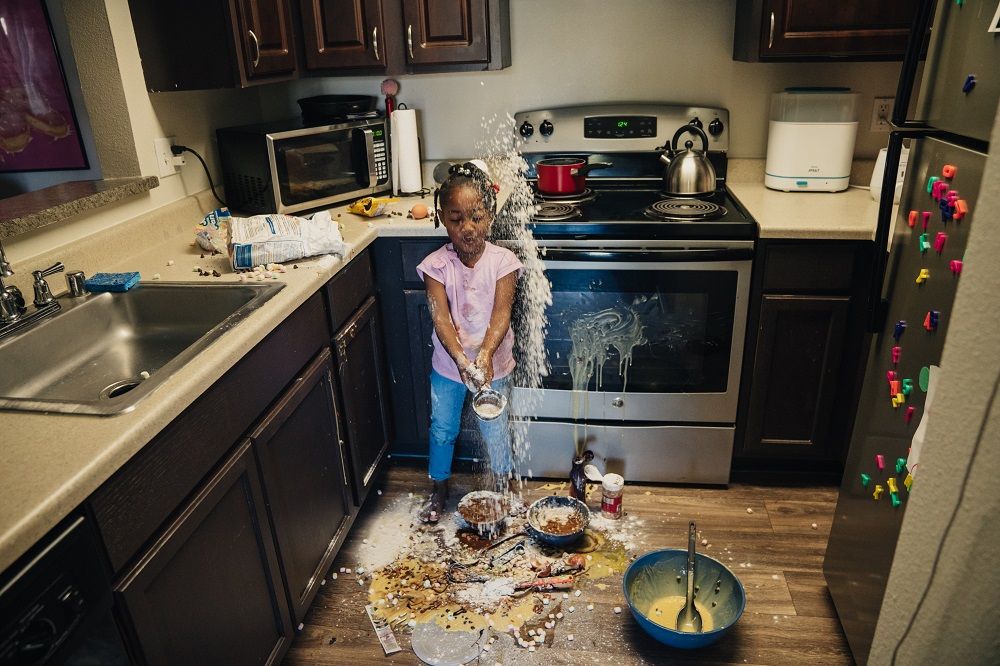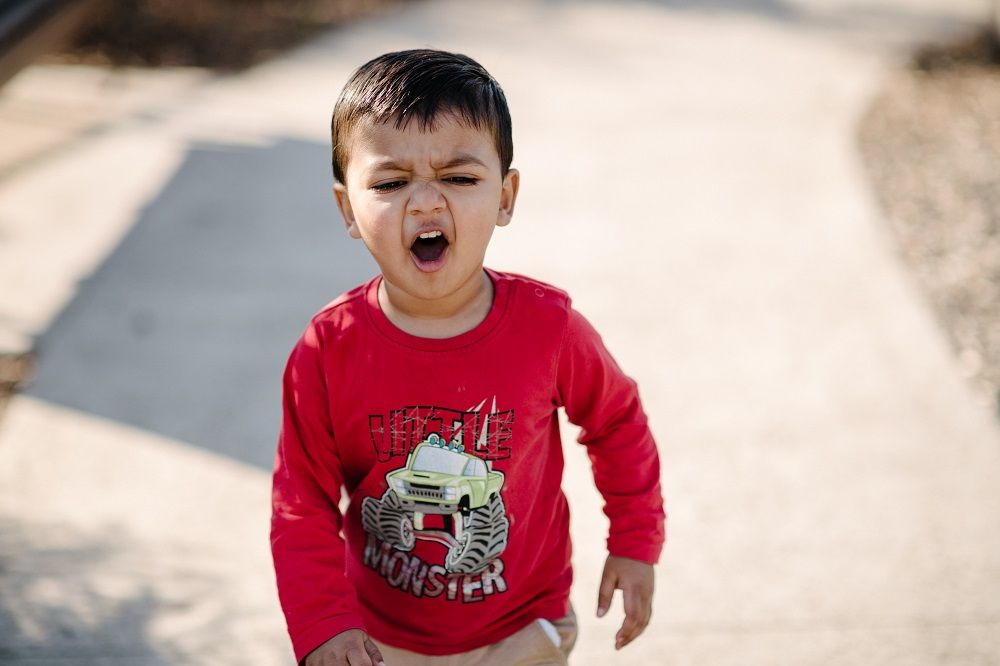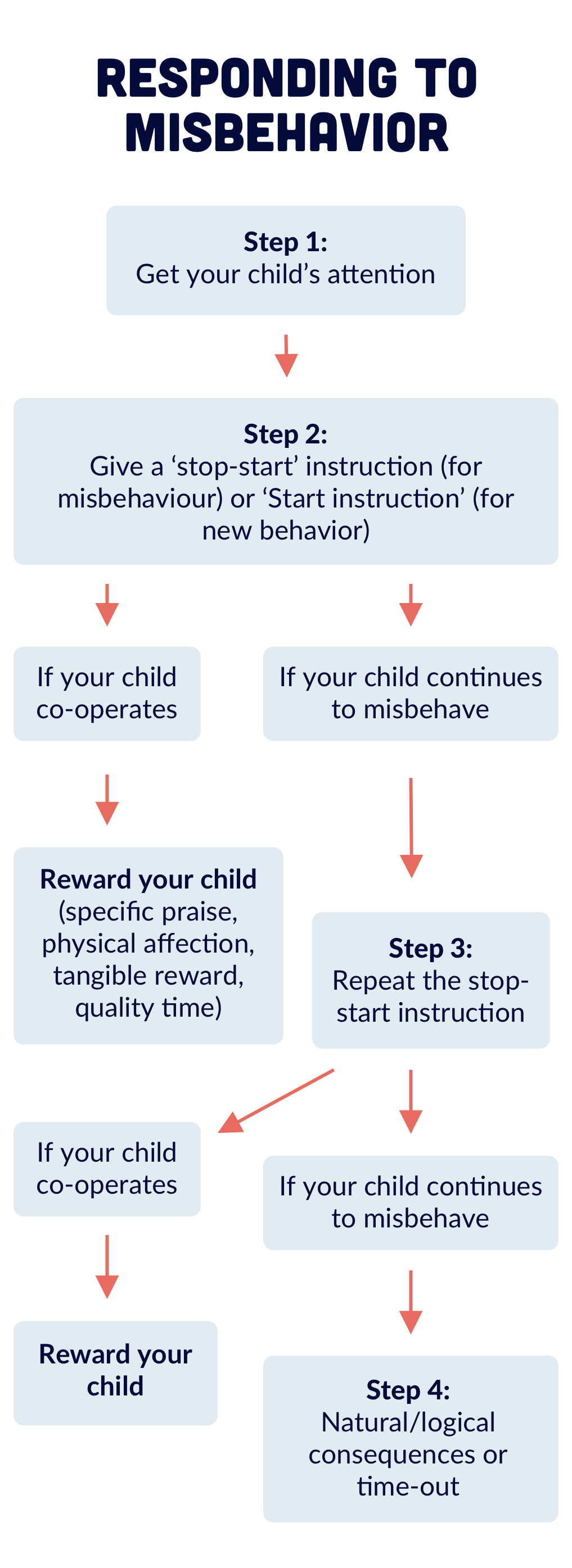What to do when younger children misbehave
Key points:
- Why kids misbehave.
- Go-to strategies for tackling misbehavior.
- Learn about the power of attachment.
- What to do when a child is misbehaving.
- Expert-backed discipline tips.
Parenting is a tough gig at times. Especially when kids are acting up. Knowing how to handle these times is all part of the rollercoaster ride that is parenting. We’re here to help. We’ve checked in with the experts to better understand misbehavior and how to tackle it.
They’ve confirmed what we all know:
- All children misbehave at times.
- These can even be part of normal development, especially for young children who are learning to regulate their emotions and behaviors.
When misbehavior happens often and is more serious, it can cause behavior problems that can impact on the child and their family.
There are many reasons why children can develop behavior problems. It may be due to a child’s temperament and genetics, or presence of neurodevelopment conditions (such as autism). It may also be due to children’s exposure to stressful or traumatic events. Children can also learn misbehaviors from other kids or even TV shows.
Check your home environment
The family environment is one important factor that may cause kids to misbehave. Children learn to misbehave through watching others. So if kids see parents yell or shout, they learn to do this when angry or frustrated. Smacking a child can also lead to children using physical aggression with other kids or adults as a way to deal with their frustrations or solve problems.
The power of attachment
Children can also learn to misbehave because there is some sort of pay-off for the misbehavior. That might be attention from parents or getting their own way. Often when children misbehave parents stop what they’re doing and pay attention to the child. Sound familiar? This type of attention – even when it involves negative interactions such as shouting – can trigger attachment feelings in a child. We call these parenting responses ‘attachment rich’ if they involve displays of intense parent emotions, physical closeness, touching and unpredictability.
Attachment is basically the emotional bond a child feels towards their parent or main caregiver. Attachment rich describes attention that’s loaded with emotion, and it’s a powerful influence on a child’s behavior. Here’s the thing. Attachment-rich attention gives a child a sense of closeness and connection no matter if the emotion is positive such as joy, or negative such as anger.
Attachment-rich vs attachment-neutral responses
Misbehavior from kids often leads to attachment-rich responses from parents. Whereas when kids are behaving positively, parents often respond in an ‘attachment-neutral’ way. That is, not a lot of attention or emotion.
Kids crave attention or attachment-rich responses from parents. This can be a powerful motivator for their behavior. They may act up to get an ‘attachment-rich’ response from you, even if it’s anger.
What we want to do is flip the script. Changeup which behaviors receive attention and emotion from parents. The aim of the parenting game is for positive child behavior to receive attachment-rich responses (think high emotion and physical closeness). When it comes to misbehavior you want to go for calm, boring and ‘attachment-neutral’ responses (low reaction, low attention).

What can decrease misbehavior?
Parents can also use strategies such as specific praise and other rewards to encourage more positive behaviors in their children. Parents can make praise and rewards ‘attachment-rich’ by using physical affection, eye contact, using the child’s name, enthusiasm, excitement and emotional responses. All things you can easily get on board with.
When parents are dealing with misbehavior, it is important to be attachment-neutral. This means being calm, quiet and boring. Another parenting pro tip is to respond quickly and consistently. It’s also important to have a plan, so you know what you’re going to do when misbehavior occurs.
What to do when a child is misbehaving
Planned ignoring
Planned ignoring is a parenting strategy that can work for the minor misbehaviors kids use to get their parents attention such as whining and making silly noises. When it comes to planned ignoring your aim is to not give your child any attention while they are misbehaving. Then you want to give them your full attention as soon as the misbehavior stops. For example, if your child is whining that they want to have a biscuit over and over again and you’ve already told them no because it’s nearly dinner time, you could try using planned ignoring.
All you have to do is take your attention away from the child by not looking at them or speaking to them until the whining has stopped. Then when the misbehavior has stopped, give them your attention and use a reward such as specific praise (“Thank you for using a nice voice, let’s go find a game to play”).
One thing to know is that planned ignoring should only be used for minor problem behaviors. Aggression, not following instructions, and tantrums are not appropriate for planning ignoring.
It is also important to ignore the misbehavior until it stops. If you think it’s going to be too tough to ignore a misbehavior, go for a different strategy instead.
Natural and logical consequences
For some misbehaviors, a natural or logical consequence can be used if a child does not follow an instruction. A natural consequence is a consequence that is naturally occurring in this situation. Examples include:
- A child refusing to get ready for school, then they will be late for school.
- A child is refusing to eat dinner, then there is nothing more to eat until breakfast.
A logical consequence is a consequence that makes sense for the misbehavior. Examples include:
- If siblings are fighting, then the children would be separated to play alone for a brief amount to time.
- If children are fighting over a toy, the toy would be taken away for a brief amount of time.
- If a child is wandering away from a parent at a shopping center, they would need to hold parent’s hand or cart.
- If a child is playing with the food at dinner, then the food is taken away for a brief amount of time.
Keep it brief
Let’s look at an example of this strategy in action. Say you’ve separated kids who were fighting then brought them back together to play again. At this point you want to go for an attachment-rich reward for playing together nicely or taking turns. High energy, high emotion specific praise would do the trick.
One thing to keep in mind is to keep discussion about the actual consequence to a minimum. You want to keep this part of your response attachment-neutral. So low attention, low emotion.
Troubleshooting
If the natural/logical consequence is not effective (for example, a toy is returned and kids keep fighting over it), the natural/logical consequence may need to be longer (e.g., 20 minutes), or another consequence may be used (e.g., time-out).
For many misbehaviors, there is no natural or logical consequence that “fits’ the misbehavior, and time-out will be the most appropriate strategy to use.

What is time-out?
Using logical consequences and time-out
You’ll want to follow these discipline steps for maximum effectiveness.
- Approach: Walk over to your child. Get down to their level to get their attention.
- Natural/logical consequence or time-out: If after giving the stop/start instruction twice, your child does not comply, it’s time for natural/logical consequence or time-out.
Learn more about these expert-backed steps in Family Man and master these powerful parenting tools.
How to get your child’s attention when misbehaving
Getting your child’s attention can feel frustrating at times. Instead of trying to get their attention from a distance, try approaching them instead. Get physically on their level. Don’t worry about getting your child to show they’re listening. Even if they’re looking away or have their fingers in their ears, they can still hear you. Remember to be brief and clear with your instructions. If you talk too much, children will stop listening and the attention can become “attachment-rich”.
Misbehaving toddlers and pre-schoolers

Go-to discipline tips
- Use a calm, emotionless voice. Raised voices or high energy reactions can actually escalate the situation and create an unintended reward for a child.
- When giving ‘stop and start’ instructions or ‘start’ instructions avoid using questions. For example. If you ask your child: “can you stop making so much noise?” or “can you come to the table for dinner?”, young children will think they have a choice and will simply say no. If you catch yourself giving an instruction that is phrased as a question, wait 5 minutes and deliver it again as a clear instruction.
- Avoid giving instructions over and over again. By giving only two instructions, and then using a consequence, children quickly learn that they need to comply either on the first or second instruction.
- Keep discipline short and simple. This means after discipline is over, we don’t want to have lengthy discussions about out it or demand apologies. We simply want to catch our child behaving well and provide attachment-rich praise and rewards.
Family Rules
Family rules can be used from the age of about 3 years. It’s important to have only 4 or 5 rules, and they should be stated positively (e.g., “everyone sits at the table to eat”, rather than “no eating in the lounge room”).
Hold a family meeting to discuss the rules and ask for input from your child about the rules. Explain the consequences for when the rules are broken.
Write up the rules (children can help with this task or draw pictures) and then put them on a wall where everyone can see them. Family rules evolve as children develop, so you may change or add to your rules as time goes on.
Over to you
Now you have a bunch of insider tips on how to handle misbehavior in kids. Start trying them out and see what works for you and your family. It might feel tough at first but keep going. You’ve got this.
Want to learn more?
Movember launched Family Man to improve the confidence and mental health of dads.
Learn how to master kick-ass parenting strategies by getting started with Family Man. It’s an interactive parenting video series that's expert-backed and funded by Movember.
If research is your thing take a closer look at the evidence behind Family Man.
Or learn more before diving in.